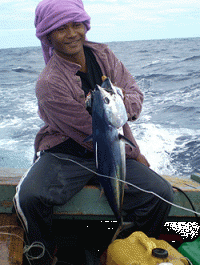Managing marine resources the local way
A growing number of Locally Managed Marine Areas (LMMAs) are being established as a way for coastal communities to conserve the resources they depend on for food and income.
A growing number of Locally Managed Marine Areas (LMMAs) are being established as a way for coastal communities to conserve the resources they depend on for food and income.
The LMMA Network has more than 500 participating villages in eight countries, including six in the Pacific: Federated States of Micronesia, Fiji, Palau, Papua New Guinea, Solomon Islands and Vanuatu. The approach has spread as far afield as Madagascar and other western Indian Ocean countries.
An example of a successful LMMA in the Pacific is the Nguna-Pele Marine and Land Protected Area Network in Vanuatu. This network includes 16 indigenous communities engaged in conserving more than 3,000 hectares of marine and terrestrial resources.
Each of the communities designated different marine conservation areas, including some off-limit tabu sites. In Unakap village on Nguna Island, three areas have been designated: a permanent reserve, where no fishing is allowed; a periodic reserve, where harvesting is only allowed for special community events; and a general use zone, which can be fished subject to bans on destructive fishing practices and over-harvesting. These measures have led to more species of fish and marine invertebrates in the community reserves compared to unmanaged areas.
IUCN is helping to improve protected area management, including the management of LMMAs, through the Pacific Island Roundtable for Nature Conservation, and the Biodiversity and Protected Areas Management (BIOPAMA) programme. IUCN and the LMMA Network are both members of the Roundtable, which helps organisations coordinate their conservation action. Across Africa, the Caribbean and the Pacific and including in the six island states of the LMMA Network, BIOPAMA promotes the use of best available science and knowledge to build capacity and strengthen decision-making for protected areas.
For further information contact Etika Rupeni, Pacific Islands Roundtable for Nature Conservation Coordinator etika.rupeni@iucn.org







